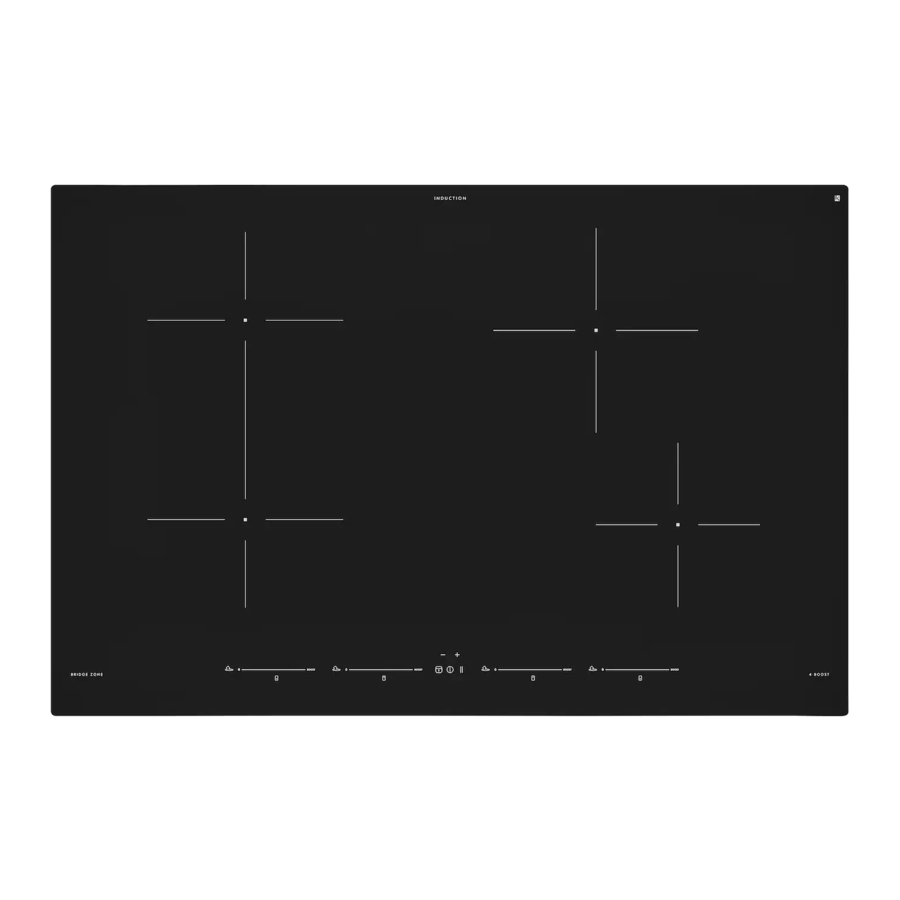IKEA UTNAMND Handbuch - Seite 20
Blättern Sie online oder laden Sie pdf Handbuch für Kochfeld IKEA UTNAMND herunter. IKEA UTNAMND 32 Seiten.

ENGLISH
The noise occurs on the cookware and can
vary depending on the amount of food or
liquid and the cooking method (e.g., boiling,
simmering, frying).
Loud whistling
This noise occurs with cookware comprised
other, and when they are additionally used
at maximum output and also on two cooking
zones. The noise ceases or quiets down
when the heat level is reduced.
These sounds are normal
Fan noises
For proper operation of the electronic
system, it is necessary to regulate the
temperature of the cooktop. For this
purpose, the cooktop is equipped with a
cooling fan, which is activated to reduce and
Care and cleaning
• Never use abrasive sponges, wire wool,
hydrochloric acid or other products
that might scratch or mark the surface.
• Food that falls accidentally or builds
up on the surface, the functional or
aesthetic elements of the Hob must
not be eaten.
•
from the mains supply before carrying
out any maintenance work.
• Clean the appliance after every use, to
prevent any residual food from burning
on. It is much harder work to remove
crusted and burned-on dirt.
• For day-to-day dirt, use a soft
cloth or sponge and a suitable
detergent. Follow the manufacturer's
recommendations regarding detergents
to be used. The use of protective
detergents is recommended.
• Remove crusted dirt, for example milk
that has boiled over, using a scraper
pad suitable for vitreous ceramic,
while the cooke-hob is still hot. Follow
regulate the temperature of the electronic
system. The fan may also continue to run
detected temperature of the cooktop is still
Rhythmic sounds, similar to the ticking
sound of a clock
This noise occurs only when at least three
cooking zones are operating and disappears
or weakens when some of them are
normal element of the described induction
technology and should not be regarded as
defects.
the manufacturer's recommendations
regarding scraper pads to be used.
• Remove food containing sugar, for
example jam that has spilled during
cooking, using a scraper pad suitable
for vitreous ceramic, while the Hob is
still hot. If you do not, the residue may
damage the vitreous ceramic surface.
• Remove any melted plastic using
a scraper pad suitable for vitreous
ceramic, while the Hob is still hot. If
you do not, the residue may damage
the vitreous ceramic surface.
• Remove limescale using a small
amount of limescale remover solution,
for example vinegar or lemon juice,
once the Hob has cooled down. Then
clean again with a damp cloth.
•
the surface, and do not drop hard
objects onto it. Do not drag pans or
plates over the surface.
• Do not use steam cleaning equipment.
20
